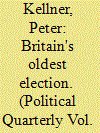| Srl | Item |
| 1 |
ID:
092641


|
|
|
|
|
| Publication |
2009.
|
| Summary/Abstract |
Fringe political parties did well in the European Parliament elections in June 2005. The British National party won their first seats; altogether, four in ten British voters supported a party not represented in the House of Commons at Westminster. YouGov questioned more than 32,000 electors at the time of the election, in order to find out who voted for each party and why: the sample was big enough to enable robust analysis to be done on the BNP, UKIP and Green vote, as well as the supporters of Labour, the Conservatives and the Liberal Democrats. YouGov's findings show that there was disillusionment with the traditional main parties, and fears for the future, that were felt by voters across the political spectrum, and not just the supporters of the fringe parties.
|
|
|
|
|
|
|
|
|
|
|
|
|
|
|
|
| 2 |
ID:
124577


|
|
|
|
|
| Publication |
2013.
|
| Summary/Abstract |
Security, environment, and economic concerns are commonly identified as three major objectives of energy policy. State and federal governments have set aggressive targets for carbon emissions reductions and for alternative fuel use and increased vehicle efficiency to reduce petroleum consumption. Moreover, jobs creation and GDP growth are often cited as key drivers for energy policies. Previous studies on energy policy decision-making have examined the process for developing and evaluating options using multi-criteria decision analysis tools. In addition, energy opinion polls have either elicited preferences between two goals or whether the public supports a specific policy action. In this article, we report results from a survey of 884 members of professional membership organizations on how the U.S. should prioritize energy policy across the goals of energy supply security, environment and climate, and economics and job creation. The majority favor policymaking that is balanced across all three. Security and economic concerns increase with age for male respondents, whereas environment is the highest priority for females regardless of age. Unlike previous surveys that target the general public and focus on a particular objective or technology, these results provide an example of eliciting a portfolio allocation across multiple energy policy goals from targeted constituents.
|
|
|
|
|
|
|
|
|
|
|
|
|
|
|
|